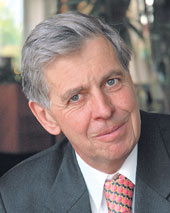 |
When did the Scandinavians become world-beaters? Nokia, named after a river in Finland, has got people talking around the globe. Ikea?s clean-cut lines have made it to homes in every continent. And Oriflame, a mid-sized Swedish cosmetics company, has come charging out of the cold north and is recruiting saleswomen to sell its wares in countries like India, China and Russia.
?The future is in the emerging markets,? says Robert Af Jochnick, chairman, Oriflame.
That wasn?t exactly obvious back in 1967 when two young brothers, Robert and Jonas threw up jobs with companies like Coke and Polaroid and took the bizarre decision to start a cosmetics company that would direct sell its wares to the women of Sweden. Their mother took the decision philosophically. ?Her reaction was, ?both of you can always come back and sleep in my kitchen?,? says Robert with a smile.
Putting the company on the map was, inevitably, a tough slog. The brothers ? who had borrowed their ideas from giants like Tupperware ? started from a garage and they spent about 50 per cent to 60 per cent of their time on the road in the early years, keeping the tiny operation on even keel. But they quickly discovered that Sweden simply was not large enough for their ambitions. So, they looked further afield, first to neighbours like Norway and Finland and then to other parts of Europe. Says Robert, ?The Swedish market is so small. You have to build a market outside.?
Ten years ago Oriflame figured it was time for a splashy debut in the Indian market. It was a move strongly backed by Robert who now admits that the country wasn?t ready for it. Quite simply, the Indian middle class had less buying power than the company had anticipated and very few women showed interest in selling the company?s products. If that wasn?t enough, in that era of tough import regulations Oriflame couldn?t bring in its products from abroad. So, it had to spend heavily on a factory in India. Says Robert, ?People talked about the Indian middle class but we couldn?t find them. We were carried away by hopes rather than reality.?
The fact is that Oriflame has invested millions in India and so far it doesn?t have much to show for it. He says frankly, ?For 10 years we?ve invested millions in India and we haven?t got any profits.? But he reckons that it?s now payback time and that the company can use the experience it has gained over the last decade. ?Today all brands are available in India. And there is a middle class one can target,? he says.
Over the years Robert and Jonas have split responsibilities in the company. For the last few years Robert has been the chairman and his brother has held the designation of chief financial officer. One son has come into the euro 650 million business which is still heavily family controlled. ?We complement each other,? says Robert about the division of labour between his brother and him.
Oriflame has always been a strongly entrepreneurial company that?s ready to grab opportunities when they came along. And its big moment came with the collapse of the Berlin Wall in the early ?90s. The company took courage into its hands and entered the Wild West-like markets of Russia. Russian women starved of high quality cosmetics and also unused to high-pressure selling tactics, became big Oriflame fans. The result is that today 50 per cent of its sales come from Russia. It was also quick to grab opportunities in eastern Europe and it is a market leader in several. By comparison, only a tiny part of its sales are in its home market Sweden.
The result of its successful expansion drive in the ?90s is that Oriflame is now a true multinational with a presence in 60 countries. In the last decade it has moved into 20 new markets including countries as far apart as Azerbaijan and India. In each country it has recruited an army of women to sell its products. The company has also fared well in several other eastern European countries
And it has now turned its attention to the fast-growth nations of Asia ? countries like India, China and Vietnam where it?s convinced women are looking for new beauty options. It has just launched operations in China but it has been a quick take off and its operations there are already bigger than in India.
In other ways too, the company has turned into a giant ? though it?s still streets behind industry giants like Avon. Today Oriflame has about 500 products in its portfolio and it tests hundreds of new products each year. What?s more, it?s localising its products for each market. So, for instance, it has introduced ? like all other cosmetics companies ? skin-whitening products which are big sellers in the Indian market.
One problem Oriflame has faced is that it has been tough to recruit women to become direct sales agents in India. Robert reckons that women in China are less bound by tradition and are willing to get into the business of selling. In India, it has been tough to sign up women for the task though he insists that the returns are good.
Nevertheless, he?s cautious about India which he visited recently after a gap of five years. ?We?ve learnt to take one step at a time in India,? he says. ?But we?ve grown very well in the last 12 months and the signs are very encouraging.?
Direct selling is a tough game and the cosmetics business is incredibly tough. So, would he do it again, if given a choice? ?I would raise a lot of money and make a big push into eastern Europe,? says Robert. ?And I would love to do it all again.?










